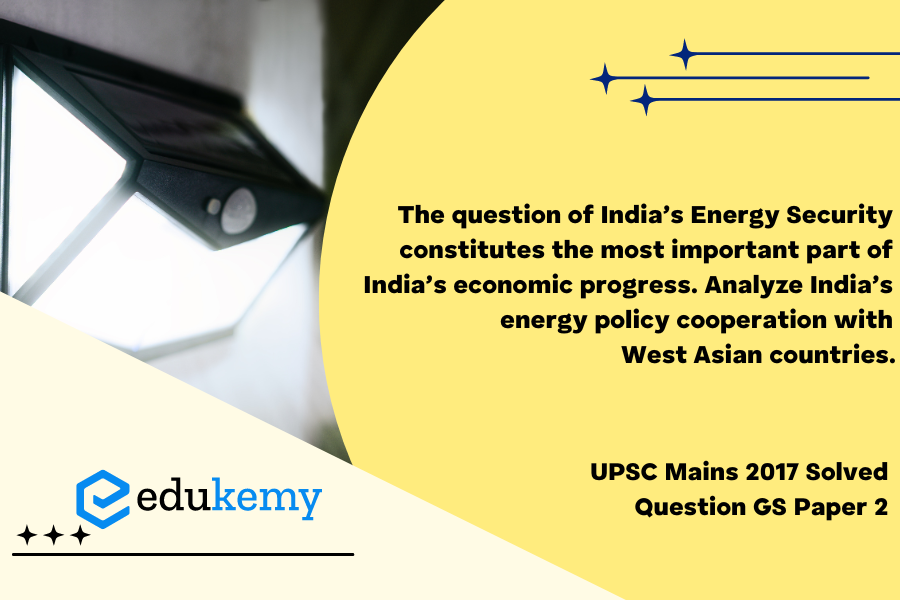The question of India’s energy security stands as a pivotal factor influencing the trajectory of its economic progress. As one of the fastest-growing economies globally, India’s burgeoning energy demands require a strategic and comprehensive approach. In this context, the cooperation between India and West Asian countries becomes paramount in shaping and ensuring a stable energy future for the nation. India’s energy policy, particularly its engagements with West Asian nations, holds significant implications for both regional stability and the country’s economic development. This analysis delves into the dynamics of India’s energy policy collaboration with West Asian countries, exploring the multifaceted aspects of this partnership and its impact on India’s pursuit of a secure and sustainable energy landscape. From diplomatic ties to economic considerations, the examination of this strategic cooperation sheds light on its implications for India’s energy security, contributing to a nuanced understanding of the complex interplay between geopolitics, economics, and energy in the contemporary global context.
Tag: International Relations.
Contents
Decoding the Question:
- In the Introduction, try to briefly write about Energy Security and its importance in West Asian countries.
- In Body,
- Write about India’s energy policy cooperation with West Asian countries and mention its various benefits. Also, mention some challenges with the policy.
- Suggest some measures to address the issues.
- In Conclusion, try to write the overall importance of energy security and suggest some long-term policy measures.
Answer:
The Indian economy is one of the fastest-growing major economies in the world. To sustain the high economic growth of around 8% in the coming decades, energy security is of paramount importance to India. Despite India’s efforts to develop its domestic energy capacity, it is dependent on imports for 80% of its oil needs, of which roughly 55% is sourced from the Persian Gulf region and more than 80% of gas supplies. This highlights the need for energy policy cooperation with the resource-rich West Asian countries. Consequently, India has adopted a ‘Look West’ or ‘Link West’ policy in this regard.


India’s Energy Policy Cooperation with West Asian Countries and its Benefits:
- India has adopted the ‘Look West Policy’ for developing greater cooperation and engagement with West Asian countries.
- India is developing bilateral relations with several countries like Qatar, UAE, Saudi Arabia, etc. through agreements and strategic partnerships developing strong links with nations. Which could be viable sources of investment in India’s energy sector.
- It has also shifted towards a revenue-sharing model from production sharing in oil and gas exploration policy.
- India has taken up an important role in the region and engaged in developmental activities like Chabahar Port in Iran etc.
- It is also engaged in various infrastructure projects like TAPI gas pipeline, the International North-South Corridor, etc., which will have a positive effect on India’s energy engagements with the West Asian Nations.
- Its increasingly multidimensional relations with Gulf Cooperation Council (GCC) states support India’s energy security efforts.
Challenges in India’s Energy Policy Cooperation with West Asian Countries:
- India lacks skilled and able personnel in its embassies and missions abroad which has a serious impact on its relations with those countries.
- The internal insecurity in the countries like Iran, Yemen, etc., is creating a threat to India’s development activities and diplomatic efforts.
- The narrow bureaucratic approach of India for the region, by looking at it through the prism of energy security and Pakistan is a major roadblock in relations.
- India’s relations with the US and policies of the US like CAATSA, etc., is creating apprehension and hurdles in the bilateral relations of India with West Asian countries.
Energy is vital for socio-economic development, and India’s rapid economic growth has heightened energy consumption. Initiatives such as the International Solar Alliance and FAME scheme demonstrate comprehensive efforts domestically and internationally to meet growing energy demands in a competitive geopolitical environment. India’s energy policy in West Asia is intertwined with ensuring maritime security in crucial waterways like the Persian Gulf and Indian Ocean, especially with the increasing presence of major players like China. India must navigate this geopolitical landscape to safeguard its energy security.
In case you still have your doubts, contact us on 9811333901.
For UPSC Prelims Resources, Click here
For Daily Updates and Study Material:
Join our Telegram Channel – Edukemy for IAS
- 1. Learn through Videos – here
- 2. Be Exam Ready by Practicing Daily MCQs – here
- 3. Daily Newsletter – Get all your Current Affairs Covered – here
- 4. Mains Answer Writing Practice – here


